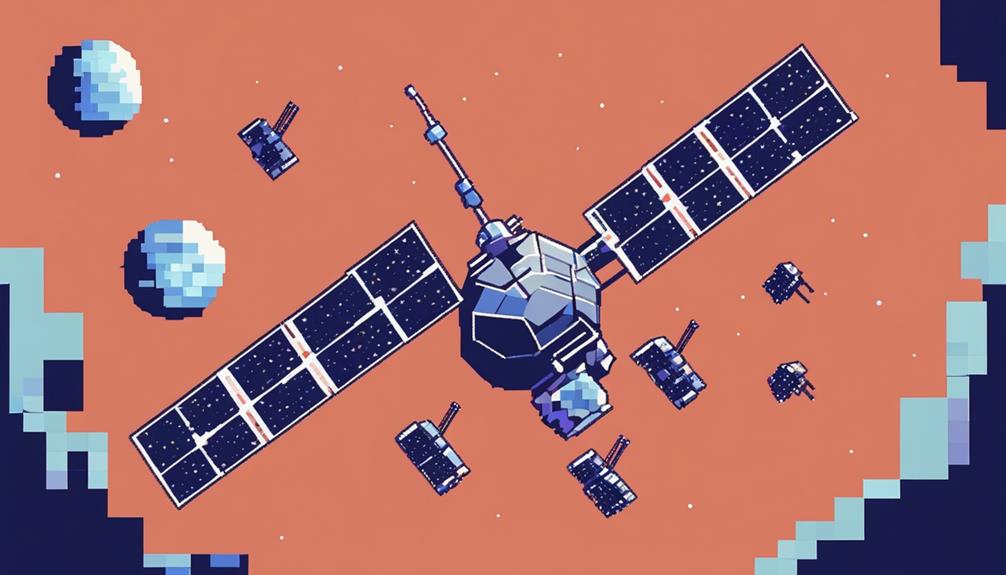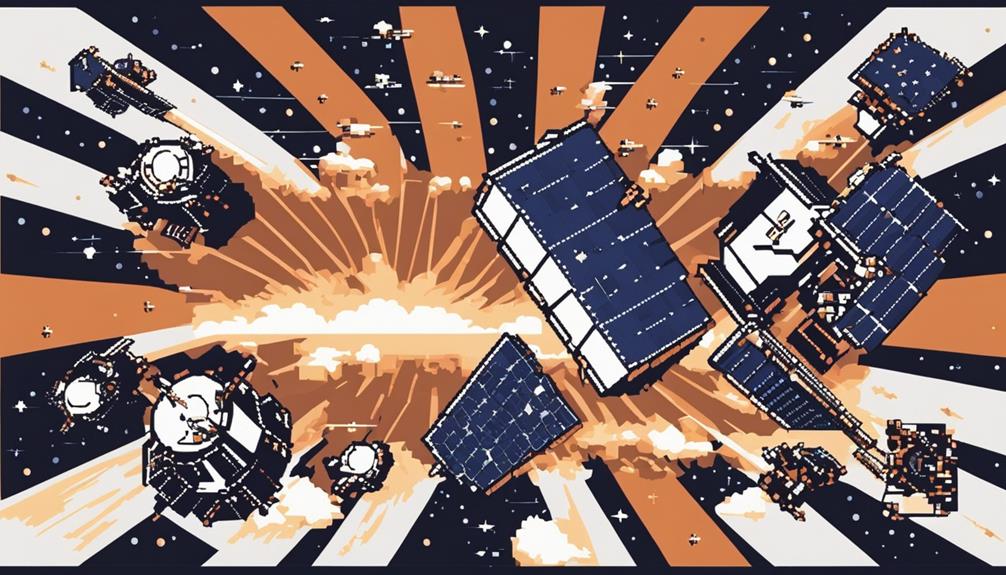In the intricate realm of the satellite industry, the intersection of antitrust and competition law stands as a pivotal point of examination. As satellite constellations expand at an unprecedented rate, the implications of market dominance, regulatory challenges, and the intricate web of antitrust regulations require meticulous scrutiny. The evolving landscape of satellite mega-constellations beckons a nuanced approach to ensure equitable competition, innovation, and the preservation of space resources. The interplay between antitrust laws and the unique dynamics of satellite ventures unveils a realm where strategic enforcement and regulatory foresight are paramount.
Key Takeaways
- Antitrust regulations safeguard fair competition and prevent monopolistic practices in the satellite industry.
- Compliance with antitrust laws fosters innovation, fair pricing, and consumer benefits.
- Collaboration on regulatory standards ensures a dynamic and competitive satellite market.
- Global cooperation is crucial to address antitrust issues and protect consumer choice in satellite services.
Market Dominance in the Satellite Industry

Market dominance within the satellite industry is a critical factor that shapes competition dynamics and regulatory scrutiny in the global market. SpaceX's Starlink project, aiming to deploy thousands of satellites for global broadband coverage, signifies a significant push towards consolidating market share. Viasat and Inmarsat, other key players, are also investing in launching large satellites to remain competitive in the industry. Assessing market dominance involves evaluating financial metrics such as EBITDA growth and free-cash flow margin to gauge competitiveness among industry players.
Competition law plays a pivotal role in ensuring that market dominance does not lead to monopolistic practices within the satellite industry. Antitrust regulations are essential for maintaining fair competition and preventing any single entity from controlling the market. The potential for consolidation within the industry is closely linked to market dominance and the regulatory environment. Regulatory actions are designed to preserve a competitive landscape that benefits consumers and promotes innovation.
Regulatory Oversight Challenges
Given the intricate interplay between technological advancements and regulatory frameworks in the satellite industry, addressing regulatory oversight challenges presents a complex task requiring meticulous attention to the sustainability of the Outer Space environment amidst the proliferation of satellite mega-constellations. The regulatory landscape governing the satellite industry is confronted with the daunting task of managing the delicate balance between fostering innovation, ensuring fair competition, and safeguarding the Outer Space environment from potential harm caused by overcrowding.
One of the primary regulatory oversight challenges stems from the need to harmonize international and national regulations to effectively govern satellite activities. The rapid growth of satellite mega-constellations, with their vast numbers of planned satellites, poses a significant risk of overcrowding in Outer Space, necessitating proactive regulatory measures to mitigate this threat. Regulators face the intricate task of fostering collaboration among industry stakeholders to develop robust regulatory frameworks that address the unique complexities of satellite mega-constellations.
Moreover, the evolving nature of satellite technologies demands continuous updates to regulatory standards to adapt to changing circumstances and ensure sustainable development in Outer Space. Effective regulatory oversight in the satellite industry hinges on proactive engagement with industry players, policymakers, and international bodies to navigate the intricate regulatory landscape and uphold the long-term sustainability of Outer Space.
Antitrust Laws and Satellite Companies

Navigating the intricate web of antitrust laws presents a critical challenge for satellite companies like Starlink, Viasat, and Inmarsat in the competitive satellite industry landscape. The business model of satellite companies, particularly those involved in mega-constellations, is heavily regulated to prevent anti-competitive practices and ensure fair market competition. These regulations are enforced at the national level, where authorities scrutinize mergers, acquisitions, and collaborations within the satellite industry to preserve competition and prevent monopolistic behavior.
Satellite companies operating mega-constellations face unique antitrust challenges due to their scale and potential market dominance. Compliance with antitrust regulations is essential for these companies to strike a balance between innovation and market competition. By adhering to antitrust laws, satellite companies can foster an environment that encourages technological advancements while ensuring consumer choice and fair pricing.
Antitrust laws play a fundamental role in shaping the competitive landscape of the satellite industry. They serve as a safeguard against anti-competitive behavior, promoting a level playing field for both established companies and new entrants. Ultimately, by complying with antitrust regulations at the national level, satellite companies can contribute to a more dynamic and innovative satellite market that benefits consumers and industry stakeholders alike.
Competition Law Enforcement
The enforcement of competition law within the satellite industry focuses on curbing monopolistic practices and ensuring a level playing field among satellite operators. Competition policy is a key aspect of this enforcement, guiding regulators in monitoring the market to prevent anti-competitive behavior. Cartel investigations play a crucial role in uncovering any collusive activities among satellite operators that could distort market competition. Pricing strategies are also closely scrutinized to ensure fair pricing practices that benefit consumers and foster healthy competition.
Regulators keep a close eye on mergers, acquisitions, and collaborations within the satellite sector to prevent any potential violations of competition laws. By monitoring these activities, regulators aim to protect market competition and prevent any entity from gaining undue market power. Enforcement actions against violations of competition laws in the satellite industry are essential to promote innovation, enhance consumer choice, and maintain efficient market dynamics. Satellite operators must adhere to competition regulations to avoid facing fines, penalties, and legal actions that could significantly impact their market position and operational capabilities. Ultimately, effective competition law enforcement in the satellite industry fosters a competitive market environment that benefits both industry players and consumers alike.
Impact of Mergers and Acquisitions

Consolidation resulting from mergers and acquisitions in the satellite industry can significantly impact market dynamics by altering competition levels and market power distribution among satellite operators. When companies merge or acquire one another, there are several key effects that can shape the industry landscape.
One significant impact is on innovation. Mergers and acquisitions can either foster innovation through combined resources and expertise or stifle it by reducing the incentive to compete through innovation. The effect largely depends on how the merged entity strategizes its research and development efforts post-consolidation.
Pricing effects are another crucial aspect influenced by mergers and acquisitions. With fewer players in the market due to consolidation, there is a higher likelihood of price increases as competition lessens. Consumers may face limited choices and potentially higher costs for satellite services.
Moreover, market access limitations can arise as a result of consolidation. Smaller competitors or new entrants may find it more challenging to access the market dominated by larger, merged entities. This can hinder overall market competitiveness and limit the diversity of services available to consumers.
Regulatory bodies closely monitor these impacts to ensure that mergers and acquisitions do not lead to anti-competitive behavior that could harm consumers or stifle market competition.
International Antitrust Considerations
How do international antitrust considerations impact the regulatory landscape of the satellite industry? International collaboration and adherence to industry standards play a vital role in shaping competition dynamics in the global market. Regulatory harmonization is essential to address cross-border challenges and ensure fair competition among satellite operators.
- International Collaboration and Industry Standards: In the satellite industry, cooperation on an international level is crucial to establish common ground rules and standards. This collaboration helps in promoting fair competition, preventing monopolistic practices, and fostering innovation across borders.
- Global Market and Competition Dynamics: The satellite industry operates in a global market where competition dynamics are influenced by factors such as technological advancements, market demand, and regulatory frameworks. Antitrust considerations at an international level aim to maintain a level playing field for satellite operators and prevent anti-competitive behavior that could distort market competition.
- Regulatory Harmonization and Cross-Border Challenges: Ensuring regulatory consistency and harmonization is essential to address cross-border challenges in the satellite industry. Differences in antitrust laws and enforcement mechanisms across jurisdictions can create complexities for satellite operators, highlighting the need for a coordinated approach to regulatory oversight.
Satellite Industry Monopolies

International collaboration and adherence to industry standards in the satellite industry are crucial for fostering fair competition globally, but concerns arise when examining the potential impacts of satellite industry monopolies on market dynamics and innovation. Market competition in the satellite industry can be significantly impacted by monopolies, particularly when dominant players like Starlink wield substantial market power. The presence of monopolies raises concerns about innovation restrictions, as limited competition may reduce the incentives for companies to innovate and invest in research and development.
Monopolistic practices in the satellite industry can have far-reaching consequences. They may lead to higher prices for consumers due to the lack of competitive pressure on pricing strategies. Additionally, satellite industry monopolies could limit consumer choices and access to services, as competitors may find it challenging to enter the market or expand their offerings in the presence of a dominant player.
To address these issues, antitrust regulations play a vital role in preventing monopolistic behaviors and ensuring fair competition within the satellite industry. Competition law enforcement is essential to maintaining a level playing field for all industry participants, promoting innovation, and safeguarding consumer interests. By monitoring and regulating market competition, authorities can mitigate the negative effects of monopolies, fostering a more dynamic and innovative satellite industry.
Antitrust Violations and Penalties
Antitrust violations in the satellite industry can result in significant penalties, including fines and sanctions, as companies found guilty may face legal consequences such as divestitures or restrictions on business practices. Enforcement mechanisms are in place to ensure compliance with antitrust laws and prevent anti-competitive behavior. Regulators closely monitor the satellite industry to maintain fair competition and prevent monopolistic practices.
Antitrust Violations and Penalties
When companies engage in antitrust violations in the satellite industry, they can face severe legal consequences. These violations not only harm fair competition but also have a direct impact on consumers. Here are key points to consider:
- Legal Consequences: Companies found guilty of antitrust violations may be required to divest certain assets or face restrictions on their business practices. These measures aim to restore fair competition in the market and prevent monopolistic tendencies.
- Enforcement Mechanisms: Regulators utilize enforcement mechanisms to ensure compliance with antitrust laws. Through investigations and penalties, they deter anti-competitive behavior and promote a level playing field for all market participants.
- Consumer Impact: Antitrust violations can have detrimental effects on consumer welfare. By hindering competition and innovation, these practices may lead to higher prices, reduced choices, and overall harm to consumers in the satellite industry.
Consumer Protection in Satellite Markets

Consumer protection in satellite markets is a critical aspect that focuses on ensuring fair pricing and service quality for satellite-based products and services, with regulatory frameworks in place to safeguard consumer rights and prevent anti-competitive practices in the industry. Policies in the satellite industry emphasize pricing transparency, service quality, and consumer rights to promote a competitive market that benefits end-users. Satellite market competition plays a pivotal role in providing consumers with a wide array of choices and driving innovation in satellite technology.
To further illustrate the importance of consumer protection in satellite markets, the table below outlines key factors and mechanisms that contribute to safeguarding consumer interests:
| Consumer Protection Aspects | Description |
|---|---|
| Pricing Transparency | Ensuring clear and understandable pricing structures for satellite services to prevent misleading pricing tactics. |
| Service Quality | Monitoring and enforcing standards to guarantee high-quality satellite services that meet consumer expectations. |
| Consumer Rights | Upholding consumer entitlements, such as privacy protection and fair treatment, through regulatory oversight and legal frameworks. |
Efforts to enhance consumer access to satellite services while maintaining a competitive market environment are crucial for fostering innovation and ensuring consumer welfare in the satellite industry. By prioritizing consumer protection, stakeholders can work towards a fair and transparent satellite market that benefits both businesses and consumers alike.
Future Trends in Satellite Antitrust
The evolving landscape of satellite industry regulations is increasingly shaped by the emergence of satellite mega-constellations, presenting unique challenges for antitrust considerations. In navigating the future trends in satellite antitrust, several key aspects come into play:
- Regulatory Compliance: As satellite mega-constellations become more prevalent, ensuring compliance with antitrust regulations becomes paramount. Regulators must adapt existing frameworks to address the complexities introduced by these vast networks of satellites.
- Industry Innovation: The future of satellite antitrust will be closely intertwined with industry innovation. Encouraging competition while fostering innovation is crucial for the continued growth and advancement of satellite technologies.
- Global Cooperation: Given the international nature of satellite operations, global cooperation is essential in addressing antitrust issues. Collaborative efforts between regulatory bodies from different countries are necessary to establish coherent and effective antitrust measures that can govern the satellite industry on a global scale.
Balancing the need for regulatory compliance, fostering industry innovation, and promoting global cooperation will be instrumental in shaping the future of satellite antitrust. Proactive measures and international collaboration will play a significant role in ensuring fair competition and sustainable growth within the satellite industry.
Frequently Asked Questions
What Are the Antitrust and Competition Laws?
Antitrust and competition laws are regulatory frameworks aimed at promoting fair market competition and preventing anti-competitive practices. These laws address issues such as market dominance, mergers, price fixing, collusion, monopolies, and regulations. By enforcing these laws, regulatory bodies ensure that companies operate within legal boundaries, fostering a competitive landscape that benefits consumers and encourages innovation. Compliance with antitrust and competition laws is crucial in maintaining a level playing field and preventing monopolistic behavior in various industries.
What Are the 3 Main Antitrust Laws?
The three main antitrust laws in the United States are the Sherman Antitrust Act, the Clayton Antitrust Act, and the Federal Trade Commission Act. These laws address market dominance, mergers, price fixing, collusion, monopolies, and cartels. The Sherman Antitrust Act of 1890 prohibits activities that restrict interstate commerce and competition. The Clayton Antitrust Act of 1914 further strengthens regulations by prohibiting practices that could harm competition. The Federal Trade Commission Act of 1914 establishes the FTC to enforce antitrust laws and protect consumers.
How Do Antitrust Laws Encourage Competition?
In shaping market dynamics, antitrust laws cultivate a landscape where fair competition thrives, fostering innovation and driving efficiencies. By curbing anti-competitive practices, these regulations pave the way for a level playing field, promoting consumer benefits such as competitive pricing and a wide array of services. The regulatory impact of antitrust laws ensures that companies compete on merit, ultimately spurring investment in technology and enhancing industry growth.
Who Regulates Satellites in Space?
Regulatory oversight of satellites in space is managed by national governments, international bodies like the ITU, and regulatory agencies such as the FCC. This framework ensures proper allocation of orbital slots and radio frequencies, coordination among satellite operators, and compliance with safety and environmental standards. International cooperation is crucial for effective space debris management and spectrum coordination. Regulatory bodies like the FCC play a key role in establishing rules for fair competition and responsible satellite operations.

